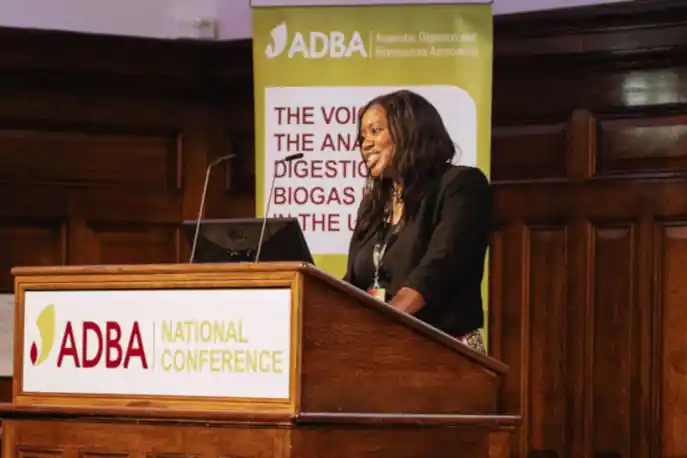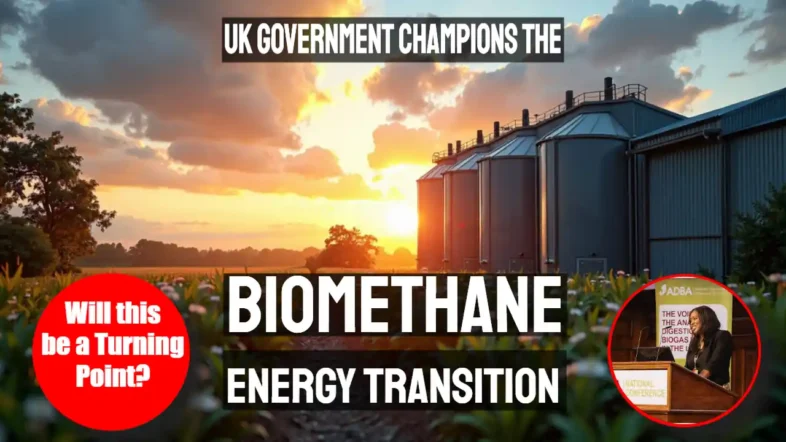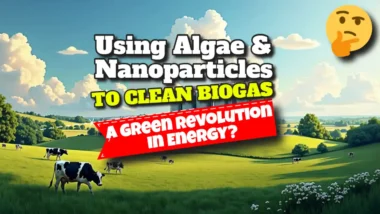The biomethane energy transition received unprecedented government backing last week (in December 2024) as Parliamentary Under-Secretary of State for Energy Miatta Fahnbulleh MP unveiled ambitious plans for green gas development at a landmark industry conference.
Speaking at the Anaerobic Digestion and Bioresources Association (ADBA) event in London, the Minister detailed how UK renewable gas investment will play a transformative role in the nation's energy strategy.
Addressing 300 industry leaders, the Minister reinforced how the anaerobic digestion energy costs could deliver substantial benefits to households, with new research revealing potential annual savings of £415 through increased biomethane adoption.
The Green Gas UK policy strategy outlined at the conference marks a decisive shift in government thinking, positioning biomethane as central to achieving both energy independence and net zero energy transition goals.
This watershed moment demonstrates a powerful alignment between government ambition and industry capability, setting the stage for rapid advancement in the UK's sustainable energy landscape. Through this enhanced partnership, the biomethane sector is poised to deliver affordable, secure, and environmentally sustainable power solutions for British consumers.
Government ‘excited’ by the potential of green gas to support its clean energy transition mission
According to an ADBA Press Release published on 16 December 2024, the UK government has thrown its weight behind the biomethane energy transition, with Energy Minister Miatta Fahnbulleh MP describing “green gas” (renewable Natural Gas also known as biomethane) as critical to delivering:
- energy,
- climate and economic security.
Speaking to 300 industry stakeholders at an ADBA conference in London, the Minister outlined how biomethane will be central to the UK's clean energy future.
Biomethane Energy Transition to Save UK Households £415 Annually
The biomethane energy transition represents a crucial shift in the UK's energy landscape, with the potential to deliver both environmental and economic benefits. The government's enthusiasm for this transition was evident as Minister Fahnbulleh addressed the Anaerobic Digestion and Bioresources Association (ADBA) conference on December 11.
“This is the most critical decade for the climate transition that we need to make in this country and globally,” the Minister emphasized. “Achieving clean power is an absolute national mission for this government, and one we are determined to deliver. It will be increasingly important for us that this industry is a whole part of the energy mix as we phase out natural gas.”
Government Commitment to UK Renewable Gas Investment
Addressing the cost-of-living crisis, which the Minister attributed to over-reliance on fossil fuels, Ms. Fahnbulleh outlined the government's commitment to green gas UK policy: “As a government, we are committed to deliver home grown green power. This is the only way to deliver energy, economic and climate security. Energy today for many is unaffordable and we are not willing to accept that.”
“Anaerobic digestion and biomethane allows us to reduce our reliance on fossil fuels. So we are looking at a transformative decade for this sector. You have set your sights high in terms of growth and I share your ambition for the industry,” she added.

Advancing Anaerobic Digestion Energy Cost Reductions and Innovation
The Minister assured delegates that the government would build an ambitious successor to support green gas post GGSS.
“We are very, very clear. We cannot do this alone – we have to work with you in partnership. We are open to ideas, willing to overcome challenges and support innovation. I'm optimistic about what I believe we can do together,” she stated.
In response to industry challenges, the Minister committed to immediate dialogue on key issues including:
- the RHI cap,
- FIT planning, and
- redesignation of biomethane in the ETS,
promising swift action where possible.
New Research Supports Net Zero Energy Transition UK Goals
At the conference, ADBA launched its groundbreaking report, “The Role of Green Gas In Net Zero; Cutting the Cost of Keeping the Lights On” (see our article about this here) developed with Business Modelling Applications (BMA). The analysis revealed that integrating more green gas in the transition to net zero could save £298 billion in future energy system costs, equivalent to £415 annually per British household.
The Anaerobic Digestion and Bioresources Association (ADBA) is the UK's leading organization promoting the biomethane energy transition
Industry Response to UK's Biomethane Strategy
ADBA Chair Chris Huhne concluded:
“We all came away optimistic that the new government is going to be addressing the issues that we've raised and on a timescale which reflects the urgency necessary to deal with climate change. Minister Fahnbulleh was tremendously positive about the future of green gas, giving the industry starting orders for a big expansion. With the right policies in place, we look forward to helping deliver clean power in 2030 and net zero in 2050.”
Understanding the Biomethane Energy Transition to Net Zero
The biomethane energy transition represents a fundamental shift in how we approach renewable energy and waste management. At its core, this transition involves converting organic waste into biomethane – a renewable natural gas that can directly replace fossil-based natural gas in our existing infrastructure.
This process not only produces clean energy but also addresses multiple environmental challenges simultaneously.
Unlike other renewable technologies, biomethane offers unique advantages in the journey to Net Zero.
It provides a circular economy solution by converting waste into valuable resources, reduces methane emissions from organic waste decomposition, and produces a renewable gas that can be used for heating, transport fuel, and industrial processes – areas traditionally difficult to decarbonize.
The biomethane transition also supports agricultural sustainability through the production of natural biofertilizers as a by-product.
The Story So Far: Development of Biomethane from Biogas in the UK
The UK's journey with biomethane began in earnest with the introduction of the Renewable Heat Incentive (RHI) in 2011, which provided crucial financial support for early adopters.
The sector saw significant growth through the 2010s as technology improved and awareness of climate change increased. Key milestones included the first commercial biomethane-to-grid plant in 2012 and subsequent rapid expansion of grid-injection facilities.
The industry's development has been marked by increasing sophistication in feedstock management, technological improvements in gas upgrading systems, and growing recognition of biomethane's role in decarbonizing the gas grid.
Government support mechanisms, including the Green Gas Support Scheme (GGSS), have played a crucial role in establishing the UK as one of Europe's leading biomethane producers.
The Current State of Biogas and Biomethane Plant Development in the UK
Today's UK anaerobic digestion (AD) industry demonstrates remarkable growth and potential. With 756 operational AD plants across the country, the sector has established itself as a crucial component of the UK's renewable energy infrastructure.
These facilities process approximately 36 million tonnes of organic waste annually, material that would otherwise contribute to greenhouse gas emissions in landfills.
The industry's impact is substantial, generating 21TWh of biogas yearly, which is either converted to electricity and heat through CHP units or upgraded to biomethane for grid injection. Currently, the sector contributes to a 1% reduction in UK greenhouse gas emissions annually and provides employment for approximately 4,800 people.
Recent trends show a 5% industry growth, with larger, grid-feeding units replacing smaller, older plants. The technology behind these operations – anaerobic digestion – involves breaking down organic matter in oxygen-free conditions within specialized digesters. This process not only produces biogas but also creates digestate, a valuable biofertiliser that helps maintain soil health.
Looking ahead to 2030, the industry has set ambitious targets. Projections indicate the potential for creating 60,000 jobs (30,000 direct and 30,000 indirect), reducing CO2 equivalent emissions by 27 million tonnes (equivalent to removing one-third of UK cars from roads), and generating enough biomethane (8 billion m³) to heat 6.8 million homes.
This current state of development demonstrates the industry's maturity and its readiness to play an even more significant role in the UK's energy transition and environmental goals.





